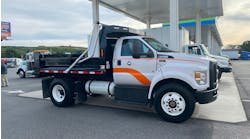Last week Donald Trump was riding shotgun in a garbage truck; this week a large majority of American voters picked him to clean up the country, electing him as 47th president of the U.S. The promise that he will restore economic growth fueled Trump’s decisive win over Vice President Kamala Harris, which included winning the popular vote. Republicans also gained control the Senate; several House races are still too close to call, though the GOP already had a majority there.
The American Trucking Associations is optimistic that this shift in power will also help the trucking industry rebound from the recent freight recession and serve as a speed limiter on aggressive federal emissions regulations favoring electrification over clean diesel technology.
"President Trump made trucking a priority throughout his first term and partnered with us to enact policies that strengthened the supply chain, grew the economy, and delivered for all Americans,” ATA President and CEO Chris Spear stated in a release on Nov. 6. “His second term offers a historic opportunity to build upon that record and show why the best approach to governing is one paved by common sense.”
EV rollback
This “common-sense” approach “begins by replacing EPA's electric-truck rule with national emission standards that are technologically achievable and account for the operational realities of our essential industry,” Spear explained.
This “electric-truck rule” refers to the EPA’s Greenhouse Gas Emissions Standards for Heavy-Duty Vehicles - Phase 3 final rule. Though it ultimately regulates the amount of emissions HD equipment can produce overall—and there are several ways using a mix of alt-fuel powertrains to reach yearly goals—the EPA has been criticized for its suggestion that in 2032, ZEVs account for 60% of light HD vocational vehicles sold, 30% of HDV, 40% of day cabs, and 25% of long haul sold.
Many veteran fleet managers and experts have weighed in, with a vast majority this publication has heard from questioning the feasibility of setting forth a quasi-mandate of untested and cost-prohibitive equipment. Margins for hauling freight are already incredibly low with diesel trucks that can go more than 1,000 miles between filling up (an act that takes about 15 minutes). Unless a miraculous breakthrough happens in the next few years, EVs will be less productive and cost more.
“All of our OEMs and engine manufacturers—they're working diligently—but you run up against the thing called physics,” noted Murray Mullen, chair and senior executive officer, and president of Mullen Group, Canadian logistics provider, at Truckload 2024 meeting in March. “And it's not that easy. If it was easy, we’d do it. And if it was cheaper, we'd have done it already.”
Trump has said he will look for ways to end any EV-related mandates, and funnel money allocated for electric vehicles from Biden’s infrastructure law, or what Trump calls the “Green New Scam,” to physical infrastructure such as roads and bridges.
Economic relief
His expected policy should also reduce fuel costs, which will help fleets’ profit margins. One of Trump’s favorite mottos is “Drill, baby, drill,” and his energy policy is likely to reflect that.
“We have more liquid gold under our feet than any other country by far,” Trump said in his Republican National Convention acceptance speech. “We are a nation that has the opportunity to make an absolute fortune with its energy. We have it and China doesn’t. Under the Trump administration just three and a half years ago, we were energy independent. But soon we will actually be better than that. We will be energy dominant and supply not only ourselves, but we will supply the rest of the world."
Under President Biden, U.S. oil production peaked higher than during Trump’s first term, with 13.2 million barrels produced in Oct. 2023 vs 13 million in 2019. But fuel prices skyrocketed during Biden’s term due to hesitancy from the oil industry to make new investments and a weak foreign policy that did nothing to curtail conflicts in Ukraine and the Middle East.
Trump wants to mediate peace between Russia and Ukraine, and Isreal and Palestine, which would stabilize the world and make things safer for commerce in general.
As the Trump tax cuts are set to expire, the ATA also noted that the trade organization wants to work with the new Congress and president “to achieve pro-growth tax reform, including repealing the century-old, punitive federal excise tax on heavy-duty trucks and trailers that penalizes our industry for investing in newer, cleaner, and safer equipment.”
The rights of owner-operators and lawsuit reform are two other messy issues the ATA hopes it can clean up by working with the incoming administration.
“The next four years will present big decisions for our nation, Spear concluded. “As we tackle these challenges and opportunities together, the Trump Administration and 119th Congress will find a constructive partner in ATA."




